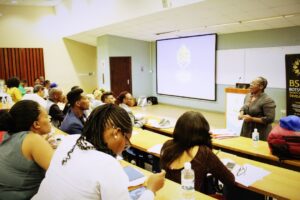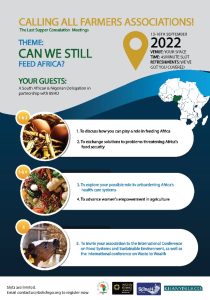Theme: ‘Loss and Damage: Building Climate Resilient Farming Communities’
The Molepolole workshop specifically targeted farmers, as findings by Statistics Botswana indicate that e.g., traditional cattle sector households have dropped drastically over the past two decades. Most farmers have settled for government safety nets. This highly successful workshop was held on April 27, 2023. It was themed ‘Loss and Damage: Building Climate Resilient Farming Communities’
Workshop motivation
Climate change poses significant challenges to farmers in Botswana, affecting their livelihoods and agricultural practices. As temperatures rise and weather patterns become increasingly erratic, farmers across the country are grappling with a range of adverse effects that threaten their crops, livestock, and overall food security.
One of the most pressing concerns for farmers in Botswana is the increasing frequency and severity of droughts. As rainfall patterns become more unpredictable, prolonged dry spells have become more common, leading to water scarcity and reduced crop yields. In many cases, farmers are forced to rely on erratic rainfall or expensive irrigation systems to water their crops, adding to production costs and reducing overall profitability.
The rise in temperatures associated with climate change also exacerbates the risk of heat stress on crops and livestock. High temperatures can lead to wilting, reduced photosynthesis, and decreased crop productivity. Additionally, heat stress can impact the health and well-being of livestock, leading to reduced milk production, weight loss, and increased susceptibility to diseases.
Furthermore, changes in precipitation patterns can also increase the incidence of pests and diseases, further threatening agricultural productivity. Pests such as locusts, armyworms, and crop-eating insects thrive in warmer climates, posing a significant threat to crops and causing extensive damage if left unchecked. Similarly, changes in temperature and humidity levels create favorable conditions for the spread of diseases among crops and livestock, leading to significant losses for farmers.
The effects of climate change are particularly pronounced in Botswana’s arid and semi-arid regions, where farming communities are already vulnerable to environmental stressors. In these areas, where water resources are limited, farmers face even greater challenges in maintaining agricultural productivity in the face of changing climate conditions.
In response to these challenges, farmers in Botswana are increasingly adopting climate-smart agricultural practices aimed at building resilience to climate change. These include practices such as conservation agriculture, agroforestry, and crop diversification, which help to conserve soil moisture, enhance soil fertility, and reduce the risk of crop failure.
Furthermore, initiatives such as the promotion of drought-resistant crop varieties, the development of water harvesting techniques, and the provision of climate information services are helping farmers to better adapt to changing climate conditions and mitigate the impacts of climate change on their livelihoods.
However, despite these efforts, the challenges posed by climate change continue to pose significant risks to Botswana’s agricultural sector. Urgent action is needed to support farmers in adapting to climate change, improve access to resources and technologies, and build resilience to future climate-related shocks. Only through concerted efforts at the local, national, and global levels can farmers in Botswana effectively address the challenges posed by climate change and secure their livelihoods for future generations.
To intervene, the Loss and Damage Workshop Series project was launched with the objectives to:
1. Share coping mechanisms e.g., tips on building climate friendly infrastructure
2. Highlight places where participants can swiftly get assistance
3. Equip participants with first aid skills
4. Share adaptation and mitigation measures
5. Help citizens determine their role play in the climate fight
6. Sensitise the whole nation on loss and damage issues
7. Create a loss and damage network of relevant development stakeholders—including ordinary citizens.
8. Make people aware of livelihoods alternatives (some of which are a result of climate change).


